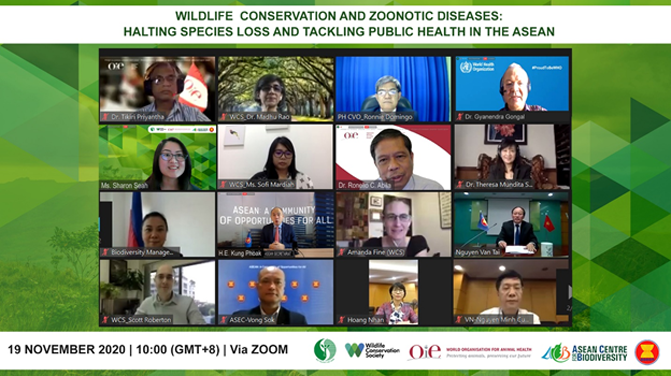ASEAN's 'One Health' Approach: cost of preventing pandemics is 2% of COVID-19 damage

LOS BA OS, 30 November 2020 The ASEAN Centre for Biodiversity (ACB), in collaboration with Viet Nam s Ministry of Natural Resources and Environment, the ASEAN Secretariat, the World Organisation for Animal Health (OIE) and the Wildlife Conservation Society (WCS) held the Wildlife Conservation and Zoonotic Diseases: Halting Species Loss and Tackling Public Health in the ASEAN webinar on 19 November.
In his opening remarks, Deputy Secretary-General (DSG) of ASEAN for ASEAN Socio-Cultural Community Kung Phoak highlighted that the COVID-19 pandemic and its recovery should be seen as an opportunity to explore ways and leverage existing partnership and initiatives towards a more collective and coordinated response to mitigate impacts.
Citing a recent study, Dr. Gyanendra Gongal, the Regional Advisor of the World Health Organization (WHO) Office in South-East Asia shared that as of July 2020, the total damage resulting from the COVID-19 pandemic has amounted to USD 11.5 trillion.
Preventing the emergence of diseases will only entail an estimated 2% of the total damage incurred in responding to the COVID-19 pandemic, he said. Applying the One Health approach for disease prevention would only cost a mere fraction of the actual damage wrought by the global pandemic.
Spending about USD 266 billion in 10 years would substantially reduce the risks of another pandemic, Dr. Gongal stressed, noting that this amount can be allocated to priority actions such as law enforcement, technical responses to early warning and surveillance systems, adequate funding, and policy advocacy efforts such as the One Health approach.
ASEAN, as a regional body, has taken steps to combat the pandemic such as the Declaration of the Special ASEAN Summit on COVID-19, the ASEAN Strategic Framework for Public Health Emergencies, and the ASEAN Comprehensive Recovery Framework and Implementation Plan to chart a path to recover and build back better.
The COVID-19 pandemic catalysed an increased awareness of the need for nature-based solutions and cross-sectoral actions, ACB Executive Director Theresa Mundita Lim said.
She further noted that as a regional hub for biodiversity conservation, the ACB has a significant role in the application of the One Health approach. The ACB is able to contribute to ensuring public health and well-being by supporting biodiversity-related programmes in the ASEAN, which include the ASEAN Heritage Parks Programme, wildlife conservation and ecosystems restoration initiatives, and the ASEAN Flyway Network. By protecting wildlife and their habitats, we reduce opportunities for viral spillovers, Lim said.
Other experts in the panel acknowledged the significant potential of ASEAN policy frameworks and legislation on the management of the wildlife trade chain with the highest risk of zoonotic pathogen emergence to contribute to maintaining ecosystem integrity. Expanding, linking, and improving protected areas will strengthen natural protective barriers between humans and animals.
ASEAN Member States such as Viet Nam and the Philippines are currently initiating One Health efforts as a response to emerging diseases like COVID-19.
Ms. Vu Thi Phuong, senior officer of Viet Nam s International Cooperation Department under the Ministry of Agriculture and Rural Development, shared the country s efforts under the One Health approach, particularly the establishment of the Vietnam One Health Partnership for Zoonoses (OHP).
Meanwhile, in the Philippines, key programmes on joint wildlife surveillance; education and public awareness campaigns, and inter-agency coordination are among the responses of the government according to Dr. Ronnie Domingo, director of the Bureau of Animal Industry of the Philippines Department of Agriculture.
The webinar encouraged lively discussions and insightful comments from the participants and viewers. A recommendation of continuing the conversation to help further unpack the concept of One Health and to tighten cross-sectoral and cross-pillar collaboration was positively received during the webinar.
Dr. Nguyen Van Tai, chairperson of ASEAN Senior Officials on the Environment and Director General of Viet Nam s Environment Administration of the Ministry of Natural Resources and Environment opened the virtual event while Dr. Ronello C. Abila, OIE Sub-Regional Representative for South-East Asia provided the conclusion and closing remarks.
Meanwhile, representatives of the public health, biodiversity, and livestock experts attended the webinar via on Zoom and Facebook live.
The webinar was moderated by Sharon Seah Li-Lian, coordinator of the ASEAN Studies Centre, ISEAS Yusof Ishak Institute, Singapore. The full recording of the webinar may be found through this link: https://bit.ly/2HofLRe






